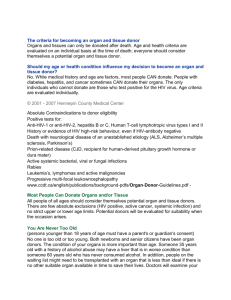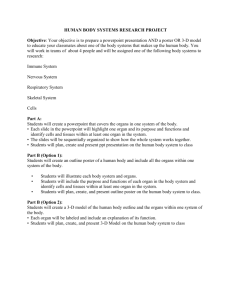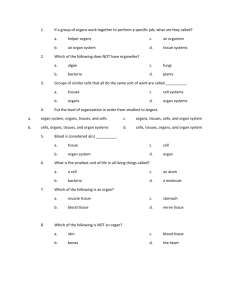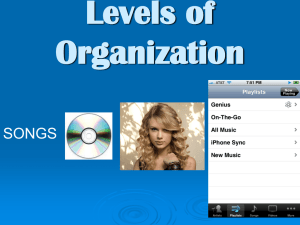1AC – Sale of Human Organs
advertisement
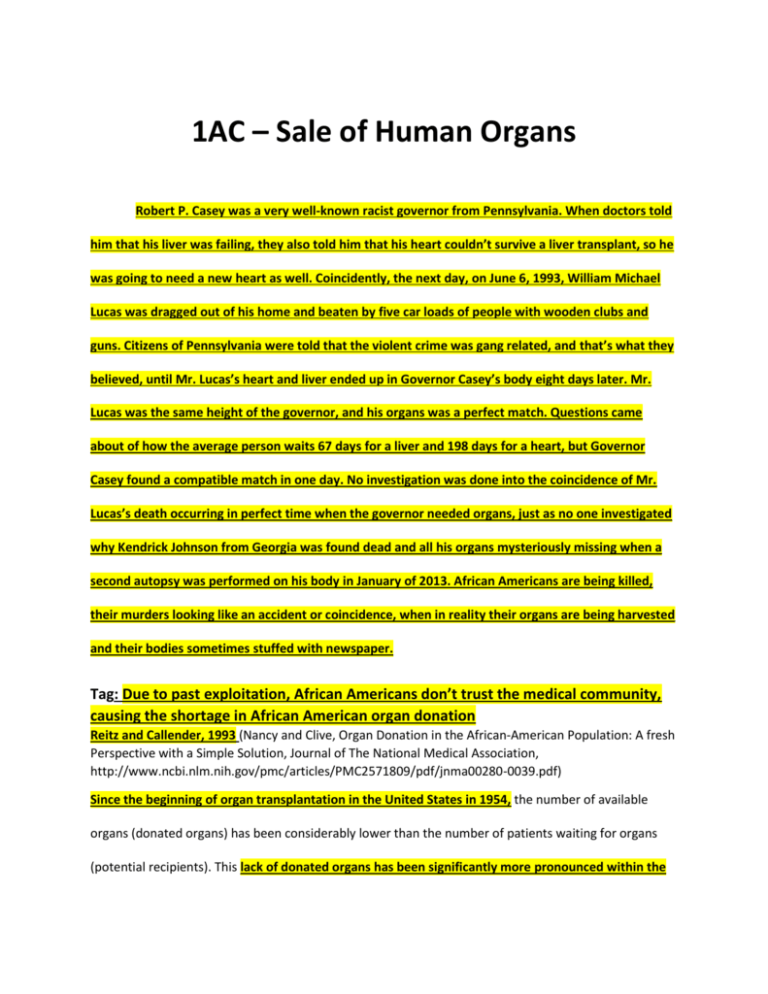
1AC – Sale of Human Organs Robert P. Casey was a very well-known racist governor from Pennsylvania. When doctors told him that his liver was failing, they also told him that his heart couldn’t survive a liver transplant, so he was going to need a new heart as well. Coincidently, the next day, on June 6, 1993, William Michael Lucas was dragged out of his home and beaten by five car loads of people with wooden clubs and guns. Citizens of Pennsylvania were told that the violent crime was gang related, and that’s what they believed, until Mr. Lucas’s heart and liver ended up in Governor Casey’s body eight days later. Mr. Lucas was the same height of the governor, and his organs was a perfect match. Questions came about of how the average person waits 67 days for a liver and 198 days for a heart, but Governor Casey found a compatible match in one day. No investigation was done into the coincidence of Mr. Lucas’s death occurring in perfect time when the governor needed organs, just as no one investigated why Kendrick Johnson from Georgia was found dead and all his organs mysteriously missing when a second autopsy was performed on his body in January of 2013. African Americans are being killed, their murders looking like an accident or coincidence, when in reality their organs are being harvested and their bodies sometimes stuffed with newspaper. Tag: Due to past exploitation, African Americans don’t trust the medical community, causing the shortage in African American organ donation Reitz and Callender, 1993 (Nancy and Clive, Organ Donation in the African-American Population: A fresh Perspective with a Simple Solution, Journal of The National Medical Association, http://www.ncbi.nlm.nih.gov/pmc/articles/PMC2571809/pdf/jnma00280-0039.pdf) Since the beginning of organ transplantation in the United States in 1954, the number of available organs (donated organs) has been considerably lower than the number of patients waiting for organs (potential recipients). This lack of donated organs has been significantly more pronounced within the African-American population. This underrepresentation of African-American organ donations has had and continues to have two primary ramifications: there is a disproportionately large number of African Americans waiting for organ transplantation, and there is a paucity in the number of potential African-American organs available for transplantation. A third concern is now becoming apparentthere is a decreased likelihood of successful transplantation due to poor tissue match between donors and African-American recipients. This article summarizes the reasons that African Americans have traditionally been less willing and available to donate organs for transplantation, and proposes solutions by focusing on and reaching out to some important and heretofore untapped resources, eg, social workers, teachers, religious leaders, and other culturally sensitive or appropriate educators who work at a grass roots level in the community.] [Of the many episodes that have contributed to this African-American distrust of the medical community, perhaps none is more appalling than the Tuskegee Syphilis Experiment in which the United States Public Health Service conducted a study of the effects of untreated syphilis on black men in Macon County, Alabama. With promises of meager benefits, more than 600 subjects "agreed" to participate in a study that had nothing to do with treatment. No new drugs were tested (even after the advent of penicillin). It was a non-therapeutic experiment, aimed at compiling data on the effects of the spontaneous evolution of syphilis in black males. In a conversation with Robert Grant, Senior Coordinator of the Maryland Organ Procurement Center, he said that this trust issue was most important. He feels that after years of distrust, the fear remains that whites are taking something away from blacks, who then tended to be reluctant when asked to donate organs. In the study at Howard University, there was considerable concern over the negative implications of cross race transplants. A significant number of respondents preferred not to cross racial barriers because they felt the black kidney was superior.8 this attitude was illustrated by Robert Grant of Maryland Organ Procurement Center in a humorous anecdote. He was attempting to obtain permission from a Navy family to donate their son's organs, but they would only consent if his organs went to another Navy person! The following excerpt was taken from a journal article entitled "The Marketing of Organ Donation."'14 This article also reported that black families will express their belief that organ donation only helps whites and that they are not inclined to cooperate to that end. "How widespread this attitude is impossible to say, but we can't be too surprised, that in a racially polarized society, altruism is bounded by the limits of racially defined communities even in the absence of specific racial hostility, black donor families may easily have a greater sense of alienation from and fear of the institutions asking them to donate their relative's organs." The United States should legalize the sale of human organs within the African American community and increase the criminal penalties of white harvesting of black organs. The previous relationship between African Americans and medical institutions has caused African American to have so must distrust toward medical institutions, that they are willing to let people of their own race die out of fear of their own life. The government can turn a negative situation into a positive by creating an incentive for African Americans to donate organs and allowing them a way to develop economically. Increasing penalties of the harvestation of black organs, and enforcing those penalties, will help the medical community regain their trust with African Americans. Tag: Monetary incentives will increase the number of organs available, and those incentives are computed by pricing 3 components of the risk of donating Becker ad Elias, 2007 (Gary and Julio, Introducing Incentives in the Market for Live and Cadaveric Organ Donations, The Journal of Economic Perspective Vol. 21 No. 3) According to Becker and Elias, with the average cost of kidney transplant being $160,000, quantity demanded exceeds the quantity supplied, and that’s how a waiting list develops. That gap would be smaller at higher costs b/c quantity demanded is reduced by a rise in cost. If gov’t subsidies or private insurance covers payments to donors, more patients would be encouraged to apply since the wait in time would reduce. Monetary incentives will close the gap between quantity supplied and quantity demanded by increasing the numbers of organs available and by raising the total cost of transplant surgery. The three components to the price of donation may affect are the quality of life, risk of mortality, and the ability to perform market and nonmarket activities for a period of time after the surgery. Tag: By pricing those three components, we can successfully have an amount that will increasing the number of organs donated and even though organ selling wasn’t successful for other countries in the history, it will work in the U.S. b/c our health community is far superior Becker ad Elias, 2007 (Gary and Julio, Introducing Incentives in the Market for Live and Cadaveric Organ Donations, The Journal of Economic Perspective Vol. 21 No. 3) Compensation by the organ seller to face the risk of dying is giving by the risk multiplied by the small increase in the probability of death. Statistical life for young adult in the U.S. is anywhere between $1.5 million and $10 million for the average annual income of $35,000 dollars. According to Maria Richards Transplantation Center at the New York School of Medicine, the risk of death from surgery is less than 1/100 of 1 percent. So the increased probability of death is valued at $5 million x 0.1 percent, or at $5,000 dollars. If an organ donor’s annual income is $35,000 dollars, that means they would suffer $2,700 dollars in foregone earnings as result of not working for four weeks due to the surgery. For the monetary compensation required by an organ seller to face the risk of a reduced quality of life, we take the expected change in the quality life multiplied by the money premium required to bear a small decrease in the quality of life; so we add a generous $7,500 to the quality of life component in the price. All together, the expected cost to donors is $15,200. Payment was once legal to kidney donors in India and Iran, 48% of Indians and 60% of Iranians reported bad health experiences afterwards, and many of those who donated asserted that if they could do it over, they wouldn’t have sold theirs kidneys. Critics of buying organs have used the evidence to support their opposition to paying for organs. However, the experience in the two Lowincome nations is hardly comparable to what would happen in the U.S. Quality of surgery would be superior, as would pre-care and post-care. After payments to donors, kidney transplants would increase by 44%. A Parallel calculation to the one stated for kidneys transplants suggest liver transplants would increase by 67%. African Americans will take advantage of the incentive of donating organs because of the economic development that will occur if they’re paid for their services. Creating an incentive of organ donation will give African Americans an economic boost in today’s society. Also, increasing donation will decrease the billions that the government spends on treatments attempting to save organs or keeping them going while the patients wait for transplant. The money that is saved should be re-directed to programs focused on bettering the health of African Americans and increasing health awareness for the African Americans community, and with African Americans being more educated on how to be healthy; it will decrease the number of African American that need a new organ to begin with. In today’s society, it’s okay for woman to sell her eggs to help produce a baby and its okay for a man to sell his sperm to help produce a baby; in both situations a profit is earned of those who donate. If it’s legal for people to sell what helps create a body of full organs and receive a financial reward, then it should be legal for African Americans to sell organs.




